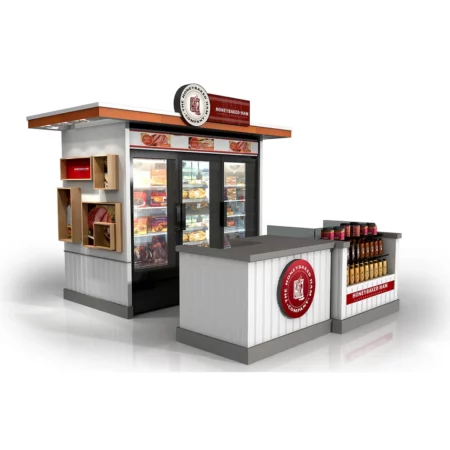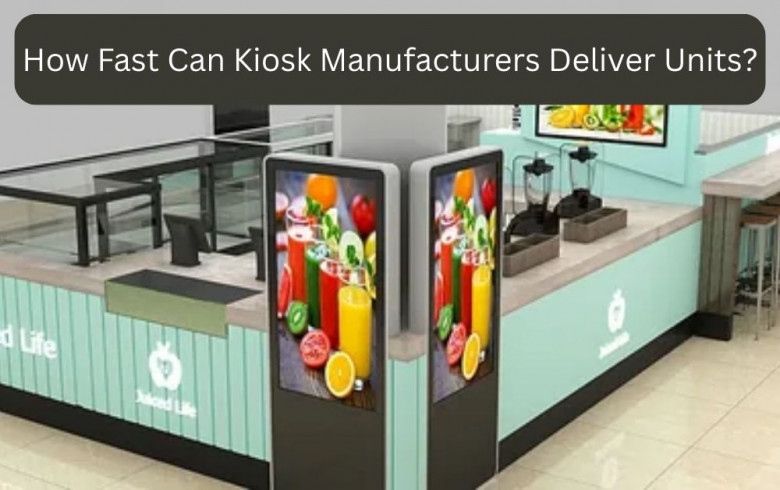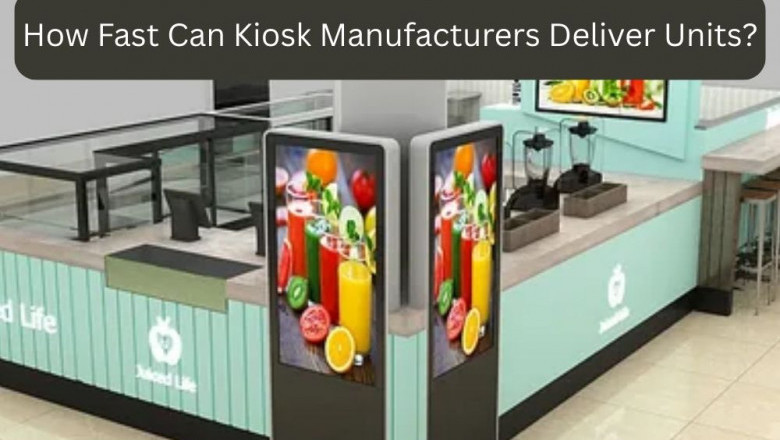views
In the modern retail and service industry, time is not just money—it’s opportunity. From airport terminals to shopping malls, quick deployment of kiosks can directly impact business performance, customer engagement, and service delivery. The speed at which kiosk manufacturers can produce and deliver units plays a vital role in determining project success. In this article, we explore how fast kiosk manufacturers can deliver their products, the factors influencing timelines, and what clients can do to expedite the process without compromising quality.
Understanding the Manufacturing Timeline for Kiosks
When businesses inquire about kiosk delivery timelines, several variables come into play. While some projects require off-the-shelf models, others demand highly customized solutions. A standard kiosk unit, if available in stock, can sometimes be delivered in as little as one to two weeks. However, more complex, tailor-made kiosks can take anywhere from 4 to 12 weeks depending on design complexity and component availability.
The Role of Customization in Delivery Speed
Customization significantly influences how quickly kiosks can be manufactured and deployed. While kiosk manufacturers may keep basic models in inventory, any deviation from standard features—such as unique branding, specialized hardware integration, or specific software requirements—extends the production timeline.
Manufacturers must consider various aspects, including:
-
Material sourcing
-
Software configuration
-
Prototype development
-
Client testing and approval
Each of these steps requires time, and effective communication between the manufacturer and the client is crucial to avoid delays.
NOTE: Businesses in Dubai had trusted top kiosk manufacturers in Dubai for high-quality, durable kiosks tailored to their needs. Acrylic Gallery Display Products LLC had provided reliable and efficient solutions. For your next kiosk project, don’t wait—contact Acrylic Gallery Display Products LLC today for custom, premium kiosks.
Impact of Production Capacity and Facilities
The production capacity of kiosk manufacturers is a defining factor in how fast they can fulfill orders. Larger manufacturers with automated production lines and advanced fabrication tools are generally faster and more reliable when fulfilling large or urgent orders.
Facilities equipped with laser cutting, CNC machining, and in-house powder coating can reduce reliance on third-party services, thereby speeding up the entire production cycle. On the other hand, smaller manufacturers may be limited by manual processes or outsourced components, which can increase lead time.
Importance of Design Finalization
One of the most overlooked delays in kiosk production is the time it takes for clients to finalize design specifications. Until the client approves the kiosk design, including hardware components, screen size, software integrations, and branding, manufacturers cannot begin mass production.
Clients looking for quick delivery should ensure that all specifications, from user interface design to payment system compatibility, are clearly communicated and locked in early in the process.
Availability of Materials and Supply Chain Factors
In recent years, global supply chain disruptions have affected the electronics and manufacturing sectors, and kiosk manufacturers are no exception. The availability of critical components like touchscreens, processors, printers, and payment terminals can delay production significantly.
Manufacturers who maintain strong supplier relationships and stock essential components can typically fulfill orders faster. Clients may want to inquire about supply chain resilience when selecting a manufacturer, especially for high-volume or time-sensitive orders.
Standard Versus Custom Kiosk Models
Standard models usually have faster delivery timelines because they are pre-designed and, in some cases, ready for immediate shipment. These models often come with modular options that can be configured quickly based on the client's needs.
Custom kiosks, on the other hand, require design input, prototype testing, and sometimes regulatory certifications, which can add weeks to the timeline. Clients needing urgent deployment should assess whether a standard model with slight modifications might suffice.
Regional Versus International Kiosk Manufacturers
Local vs Global Sourcing: Domestic manufacturers offer the advantage of reduced shipping durations, easier communication, and faster support in case of modifications or repairs.
Additionally, local manufacturing avoids potential customs delays, import taxes, and transportation uncertainties, which can extend delivery timelines when working with overseas vendors.
Communication and Project Management Efficiency
Efficient project management and transparent communication between the client and the manufacturer can drastically improve delivery speed. Delays often occur when approval cycles are slow or feedback is not promptly provided.
Reputable kiosk manufacturers usually assign project managers to streamline communication, monitor production stages, and provide real-time updates. Clients who respond quickly and maintain a direct line of contact with the project lead can help speed up the process.
The Role of Pre-Production Prototypes
Prototypes are a critical phase in the kiosk production process, especially for custom models. They allow clients to test the functionality, design, and user experience before full-scale production begins. While this step adds time upfront, it prevents costly rework later.
Manufacturers who have rapid prototyping capabilities, such as 3D printing and mock-up simulations, can significantly reduce the prototype phase duration, accelerating the overall timeline.
Installation and On-Site Deployment Timelines
Once the kiosks are manufactured and shipped, installation time becomes the next factor. Some kiosk manufacturers offer turnkey solutions, which include on-site installation, configuration, and employee training. Having the manufacturer manage this phase ensures quicker deployment and fewer logistical issues.
Clients should factor in the installation time when planning their launch and ask the manufacturer whether installation support is included or outsourced.
Case Studies on Fast Kiosk Deployment
Many kiosk manufacturers have proven track records of delivering units quickly for urgent campaigns, events, or seasonal surges. For example:
-
A retail chain launching a new loyalty program required 100 kiosks across various locations within six weeks. Thanks to pre-approved modular designs and in-stock components, the manufacturer met the deadline successfully.
-
A hospital needed patient check-in kiosks during a pandemic spike. The manufacturer adapted a standard unit with healthcare-specific features and delivered it in four weeks.
These examples highlight the importance of selecting manufacturers with a proven ability to deliver under time constraints.
What Businesses Can Do to Speed Up Kiosk Delivery
Clients have a critical role to play in ensuring fast delivery from kiosk manufacturers. Here are several ways to help streamline the process:
-
Prepare detailed specifications upfront: Avoid vague requirements that lead to multiple revisions.
-
Approve prototypes promptly: Delays in feedback can snowball into longer production times.
-
Opt for modular designs when possible: This reduces the need for custom fabrication.
-
Partner with experienced manufacturers: Prioritize those with in-house capabilities and proven delivery timelines.
-
Plan for future scalability: Consider ordering additional units in advance if expansion is likely.

Selecting the Right Kiosk Manufacturer
Choosing the right partner is key to ensuring fast and reliable kiosk delivery. When evaluating kiosk manufacturers, consider the following:
-
Do they have experience in your industry?
-
What is their average lead time for similar projects?
-
Can they provide references or case studies?
-
What in-house services do they offer (design, fabrication, testing)?
-
How do they handle installation and after-sales support?
Asking these questions upfront helps businesses align their expectations with what the manufacturer can realistically deliver.
Conclusion
Speed and efficiency are increasingly critical in today’s competitive environments, and the ability of kiosk manufacturers to deliver units quickly can make or break a project. While some delays are inevitable due to customization and supply chain issues, many can be avoided with proper planning, clear communication, and selecting the right manufacturer.
Whether you're deploying kiosks for retail, healthcare, hospitality, or public services, working with an experienced manufacturer who understands your urgency is key. By understanding the production process and playing an active role in decision-making, businesses can ensure that their kiosk deployment is both fast and successful.
For more insightful articles related to this topic, feel free to visit: npr















Comments
0 comment